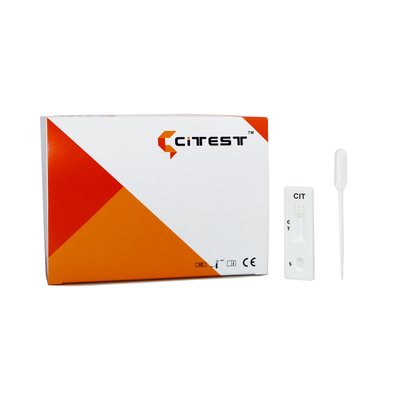A rapid test for the qualitative detection of Desmethylcitalopram in human urine.
For professional in vitro diagnostic use only.
INTENDED USE
The CIT Rapid Test Cassette (Urine) is a rapid chromatographic immunoassay for the detection of Desmethylcitalopram in urine at a cut-off concentration of 500ng/ml. This test will detect other related compounds, please refer to the Analytical Specificity table in this package insert.
This assay provides only a qualitative, preliminary analytical test result. A more specific alternate chemical method must be used in order to obtain a confirmed analytical result.
Gas chromatography/mass spectrometry (GC/MS) is the preferred confirmatory method. Clinical consideration and professional judgment should be applied to any drug of abuse test result, particularly when preliminary positive results are used.
SUMMARY
Citalopram, an antidepressant of the selective serotonin reuptake inhibitor (SSRI) type, is only available as a racemic drug. Its metabolism occurs, partially, by N-demethylation to demethylcitalopram (DCIT) and didemethylcitalopram (DDCIT), but also by deamination to a propionic acid derivative (CIT-PROP) and by N-oxidation to CIT-N-oxide (NO-CIT).
CIT has equal affinity for 5-HTT and dopamine transporters. Studies have shown that compared with healthy subjects, the binding potential of thalamus and brainstem binding area in patients with depression who take 20-60 mg citalopram every day is reduced by 50% .
It is supplied as the free base in 20 mg tablets oral administration; daily oral dose for adults usually range from 20-60 mg. The common adverse reactions were nausea, dry mouth and drowsiness. The rare adverse reactions were agitation, income and anxiety. The oral bioavailability of citalopram is about 80%. 15% of citalopram is excreted by kidney, and 12%-23% of citalopram in daily dose is excreted in original form from urine.
PRINCIPLE
The CIT Rapid Test Cassette (Urine) is an immunoassay based on the principle of competitive binding. Drugs which may be present in the urine specimen compete against the drug conjugate for binding sites on the antibody.
During testing, a urine specimen migrates upward by capillary action. Desmethylcitalopram, if present in the urine specimen below the cut-off level, will not saturate the binding sites of the antibody in the test. The antibody coated particles will then be captured by immobilized Citalopram-protein conjugate and a visible colored line will show up in the test line region. The colored line will not form in the test line region if the Desmethylcitalopram level exceeds the cut-off level, because it will saturate all the
binding sites of anti-citalopram antibody.
A drug-positive urine specimen will not generate a colored line in the test line region because of drug competition, while a drug-negative urine specimen or a specimen containing a drug concentration less than the cut-off will generate a line in the test line
region. To serve as a procedural control, a colored line will always appear at the control line region indicating that proper volume of specimen has been added and membrane wicking has occurred.
DIRECTIONS FOR USE
Allow the test, urine specimen, and/or controls to reach room temperature (15-30°C) prior to testing.
1. Bring the pouch to room temperature before opening it. Remove the test cassette from the sealed pouch and use it within one hour
2. Place the cassette on a clean and level surface. Hold the dropper vertically and transfer
3 full drops of urine (approx. 120l) to the specimen well(S) of the cassette, and then start the timer. Avoid trapping air bubbles in the specimen well(S).
3. Wait for the colored line(s) to appear. Read results at 5 minutes. Do not interpret the result after 10 minutes.

INTERPRETATION OF RESULTS
(Please refer to the illustration above)
NEGATIVE: Two colored lines appear. One colored line should be in the control line region (C), and another apparent colored line should be in the test line region (T). This negative result indicates that the Citalopram concentration is below the detectable cut-off level.
NOTE: The shade of color in the test line region (T) may vary, but it should be considered negative whenever there is even a faint colored line.
POSITIVE: One colored line appears in the control line region (C). No line appears in the test line region (T). This positive result indicates that the Desmethylcitalopram concentration exceeds the detectable cut-off level.
INVALID: Control line fails to appear. Insufficient specimen volume or incorrect procedural techniques are the most likely reasons for control line failure. Review the procedure and repeat the test with a new test. If the problem persists, discontinue using the test kit immediately and contact your local distributor.
QUALITY CONTROL
A procedural control is included in the test. A colored line appearing in the control line region (C) is considered an internal procedural control. It confirms sufficient specimen volume, adequate membrane wicking and correct procedural technique.
Control standards are not supplied with this kit; however, it is recommended that positive and negative controls be tested as good laboratory testing practice to confirm the test procedure and to verify proper test performance.
Order Information
| Cat. No. |
Product |
Specimen |
Pack |
| DCIT-102 |
CIT Rapid Test Cassette |
Urine |
40T |
| DCIT-114 |
CIT Rapid Test Panel |
Urine |
40T |
| DCIT-101/111 |
CIT Rapid Test Dipstick |
Urine |
50T |

